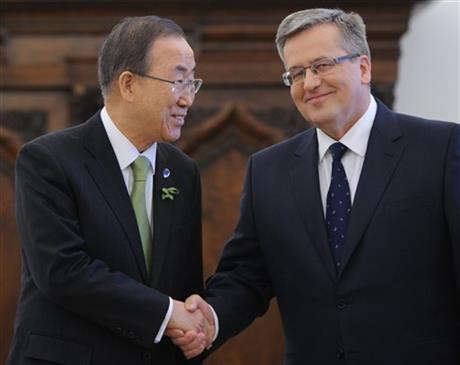
By KARL RITTER
United Nations Secretary General Ban Ki-moon, left, and Polish President Bronislaw Komorowski shake hands prior to their meeting , in Warsaw, Poland, Tuesday, Nov. 19, 2013. Ban Ki-moon will attend the U.N. Climate Conference held in Warsaw. (AP Photo/Alik Keplicz)
Yeb Sano
Phillipine delegate for climate negotiations Yeb Sano delivers his global petition to delegates at the UN Climate Conference in Warsaw, backed by over 630,000 citizens around the world and climate activists calling for urgent action to prevent more super Typhoons like Haiyand, in Warsaw, Poland, Tuesday, Nov. 19, 2013. (Alik Keplicz/AP Images for Avaaz)
Yeb Sano
Phillipine delegate for climate negotiations Yeb Sano delivers his global Avaaz petition to delegates at the UN Climate Conference in Warsaw, backed by over 630,000 citizens around the world and climate activists calling for urgent action to prevent more super Typhoons like Haiyan, in Warsaw, Poland Tuesday, Nov. 19, 2013. (Alik Keplicz/AP Images for Avaaz)
Ban Ki-moon, Bronislaw Komorowski
United Nations Secretary General Ban Ki-moon, left, listens to Polish President Bronislaw Komorowski, right, as they stand in front of a banner showing Polish national emblem , in Warsaw, Poland, Tuesday, Nov. 19, 2013. Ban Ki-moon will attend the U.N. Climate Conference held in Warsaw. (AP Photo/Alik Keplicz)
Yeb Sano
Phillipine delegate for climate negotiations Yeb Sano delivers his global Avaaz petition to delegates at the UN Climate Conference in Warsaw, backed by over 630,000 citizens around the world and climate activists calling for urgent action to prevent more super Typhoons like Haiyan, in Warsaw, Poland Tuesday, Nov. 19, 2013. (Alik Keplicz/AP Images for Avaaz)
Prev
1 of 5
Next
WARSAW, Poland (AP) — U.N. Secretary-General Ban Ki-moon on Tuesday urged governments to put forth more ambitious plans to cut carbon emissions, saying “current pledges are simply inadequate.”
Speaking to a U.N. climate conference in Warsaw, Ban said countries need to “set the bar higher” as they negotiate a new global climate agreement that is supposed to be adopted in Paris in 2015.
He asked countries to bring announcements on climate action to a special summit of world leaders in New York next September.
“From then on we will have only one year left before we meet in Paris. We do not have much time to waste,” Ban told reporters later Tuesday.
Negotiators are trying to lay the groundwork for the 2015 agreement at the two-week conference, which is set to end Friday. The deal, which would take effect in 2020, is supposed to be applicable to all nations, not just the developed countries that were covered by the Kyoto emissions pact.
But key details remain to be worked out, including the legal status of the new agreement and how to address the different expectations on poor and rich countries that have been a guiding principle of the two-decade talks so far.
Countries also have different views on when to present their national targets for emissions cuts, with the European Union saying offers should be announced at Ban’s summit and the U.S. suggesting early 2015 would make sense.
So far countries have only announced voluntary emissions targets until 2020.
Warning that people around the world now “face and fear the wrath of a warming planet,” Ban urged delegates in Warsaw to think beyond their national interests.
“Plan not only for your country, but for your neighbor and your neighbor’s neighbor,” he said in his speech.
“Climate change threatens current and future generations,” he said. “We need look no further than last week’s catastrophe in the Philippines.”
The devastation by Typhoon Haiyan there has been cited as a call for action at the U.N. talks and a sign of things to come, if the world doesn’t rein in emissions of the greenhouse gases that scientists say are warming the planet.
Though single weather events cannot conclusively be linked to global warming, rising sea levels are expected to make low-lying nations more vulnerable to storm surges. Some research suggests storms will become more powerful as oceans warm up, but there is still uncertainty in the projections.



